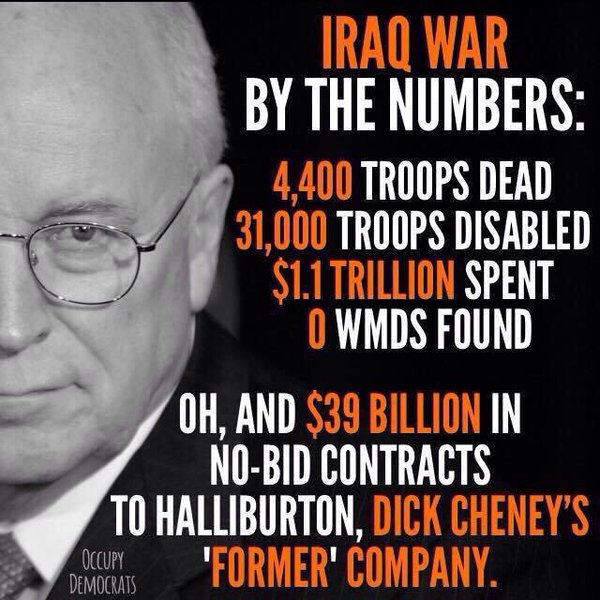And you do what?
Laugh at him?
Say, "You're going to be a house husband?"
And when he says he's going to write a memoir and he's already started it in a college class?
You laugh at him again.
Again?
First off, Zac can probably write a great memoir.
His father was a high placed politician who got caught with a prostitute.
His mother stood by his father -- or pretended to.
They both went on to cheat on each other.
They stayed married during this.
Then came more accusations when the father was governor.
And don't forget his mother's failed run for Congress.
Yeah, he could write a memoir.
And he should.
Especially after Alicia mocked him.
That was disgusting.
She was an embarrassment.
That was the worst episode of THE GOOD WIFE ever.
From early Friday night, this is Isaiah's THE WORLD TODAY JUST NUTS "Deborah Messy."

Going out with C.I.'s "Iraq snapshot:"
Monday, April 25, 2016. Chaos and violence continue, the Kurds and the
Shi'ites are at odds, the United Nations is wondering where the plan for
'day after' is, and much more.
Today, the US Defense Dept announced:
Strikes in Iraq
Attack, fighter, ground attack and remotely piloted aircraft conducted 11 strikes in Iraq, coordinated with and in support of Iraq’s government:
-- Near Baghdadi, a strike struck an ISIL staging area.
-- Near Huwayjah, a strike destroyed an ISIL tunnel system.
-- Near Fallujah, five strikes struck three separate ISIL tactical units and an ISIL staging area and destroyed three ISIL fighting positions, two ISIL mortar positions, an ISIL bulldozer, an ISIL front-end loader, an ISIL recoilless rifle and three ISIL bed-down locations.
-- Near Mosul, two strikes struck an ISIL tactical unit and destroyed three ISIL anti-air artillery pieces and an ISIL vehicle.
-- Near Sinjar, a strike struck an ISIL tactical unit and destroyed an ISIL fighting position.
-- Near Waleed, a strike struck an ISIL tactical unit.
Task force officials define a strike as one or more kinetic events that occur in roughly the same geographic location to produce a single, sometimes cumulative, effect. Therefore, officials explained, a single aircraft delivering a single weapon against a lone ISIL vehicle is one strike, but so is multiple aircraft delivering dozens of weapons against buildings, vehicles and weapon systems in a compound, for example, having the cumulative effect of making those targets harder or impossible for ISIL to use. Accordingly, officials said, they do not report the number or type of aircraft employed in a strike, the number of munitions dropped in each strike, or the number of individual munition impact points against a target. Ground-based artillery fired in counterfire or in fire support to maneuver roles is not classified as a strike.
Like that's worked.
Daily bombings since August of 2014 and Iraq's no closer to the political solution US President Barack Obama insisted June 19, 2014 was the only answer.
Worse, AFP reports, "Clashes between Kurdish and Shiite Turkmen fighters in an Iraqi town late Monday cut the main road from Baghdad to the north for the second day in a row and threatened to undermine a cease-fire agreement reached by military leaders a day earlier."
Yes, day two.
Sunday, Mohammed Tawfeeq and Tim Hume (CNN) reported, "Twenty-two fighters have been killed in ongoing clashes between Kurdish Peshmerga and Shiite militia members in northern Iraq, local security officials say, a development that complicates the fight against ISIS in the region."
DOW JONES explained it this way, "A firefight between Iraqi Kurdish fighters and a Shiite militia in northern Iraq has left at least 27 of the combatants dead and threatens to fray Iraq's fragile anti-Islamic State alliance."
But non-western outlets explained it a little differently. Dalshad Abdullah, Manaf al-Obeidi and Hamza Mustapha (ASHARQ AL-AWSAT) offered:
Kurdish sources told Asharq Al-Awsat newspaper that Iranian soldiers and militants belonging to the Lebanon-based Hezbollah had been a part of the recent battles, fighting alongside the Mobilization Forces.
During the first hours of battle, over 25 combatants belonging to the Turkmens’ side were reported dead.
On its behalf, the Turkmen party accused groups of militants coming from beyond borders of instigating dispute among the people of Tuz Khormato. In an announcement, Turkmens called out the voice of reason found in everyone to rule, so that civilians would not have to pay the price of an armed conflict.
If, two years ago, Barack had put 1/4 of the effort into diplomacy that he did into bombing Iraq, things might be different today.
Instead, he failed to lead.
And Secretary of State John Kerry's ridiculous assumption that he was Secretary of Defense did not make things better.
Diplomacy was shoved aside and the State Dept worked on corralling nations into being part of the so-called 'coalition.'
They should have put that time and energy into leading on political solutions.
Tim Arango (NEW YORK TIMES) notes the so-called 'wins' on the battlefield mean very little:
Even Fred Kaplan has caught on, writing this week at SLATE:
Barack's had no real plan. Which is why the US government has pushed the US military into the arms of groups that previously killed US troops in Iraq. And it's not just getting cozy with the League of Righteous, it's also setting these terrorists -- that's what they are -- up to be in charge of Iraq.
Stratfor offers an analysis which opens:
In some ways, the fight against the Islamic State in Iraq has masked the country's deep fragmentation. During their campaign against the jihadist group, Iraq's many ethnic and religious groups have often cooperated with one another. United by a desire to reclaim territory from the jihadist group, the Kurdish peshmerga, Shiite militias and Sunni tribal militias, along with the Iraqi government forces, have launched numerous joint operations. But competing goals among the groups, all of which desire more economic resources, territory and political influence, will bring them into conflict. Over the course of the operations themselves, longstanding tensions between the factions have already manifested. The struggle for influence and control among the groups will emerge even more fully as they overcome their common enemy.
Although Iraq's ethnic and religious communities exert their influence in the country in different ways, they share one important means in common: their militias. In Iraq, a claim to territory often translates to a claim to power. To a great extent, this is a symptom of the weakness of the Iraqi security forces. Numbering under 150,000 in front-line forces, Iraq's military suffers from poor leadership and logistics, dismal salaries and weak morale. As a result, militias in Iraq have risen to prominence, throwing much-needed support behind the Iraqi security forces. At the same time, the militias come with their own agendas.
No real thought is given. No long term plan exists.
The United Nations is noting this lack of a long term plan:
Iraq must immediately take concrete steps to plan for “the day after” the defeat of ISIL, grounded in equality, the rule of law and a vision that has earned the confidence of all the country’s diverse communities, UN Deputy High Commissioner for Human Rights Kate Gilmore urged today, at the end of a week-long visit to Iraq.
Where's the plan, Barack?
Bombing won't bring peace.
Political reconciliation?
The Iraqi government agreed to that in 2007 as part of the White House benchmarks . . . they just never implemented it like they promised to.
So until the US government is willing to hold back on weapons and aids until Iraq makes political progress, there is no progress.
XINHUA reports a Baghdad car bombing has claimed 7 lives and left thirty more injured.
In the US, War Hawk Hillary Clinton continues hoping she can escape her vote for the Iraq War and her years of support for it.
Today, the US Defense Dept announced:
Strikes in Iraq
Attack, fighter, ground attack and remotely piloted aircraft conducted 11 strikes in Iraq, coordinated with and in support of Iraq’s government:
-- Near Baghdadi, a strike struck an ISIL staging area.
-- Near Huwayjah, a strike destroyed an ISIL tunnel system.
-- Near Fallujah, five strikes struck three separate ISIL tactical units and an ISIL staging area and destroyed three ISIL fighting positions, two ISIL mortar positions, an ISIL bulldozer, an ISIL front-end loader, an ISIL recoilless rifle and three ISIL bed-down locations.
-- Near Mosul, two strikes struck an ISIL tactical unit and destroyed three ISIL anti-air artillery pieces and an ISIL vehicle.
-- Near Sinjar, a strike struck an ISIL tactical unit and destroyed an ISIL fighting position.
-- Near Waleed, a strike struck an ISIL tactical unit.
Task force officials define a strike as one or more kinetic events that occur in roughly the same geographic location to produce a single, sometimes cumulative, effect. Therefore, officials explained, a single aircraft delivering a single weapon against a lone ISIL vehicle is one strike, but so is multiple aircraft delivering dozens of weapons against buildings, vehicles and weapon systems in a compound, for example, having the cumulative effect of making those targets harder or impossible for ISIL to use. Accordingly, officials said, they do not report the number or type of aircraft employed in a strike, the number of munitions dropped in each strike, or the number of individual munition impact points against a target. Ground-based artillery fired in counterfire or in fire support to maneuver roles is not classified as a strike.
Like that's worked.
Daily bombings since August of 2014 and Iraq's no closer to the political solution US President Barack Obama insisted June 19, 2014 was the only answer.
Worse, AFP reports, "Clashes between Kurdish and Shiite Turkmen fighters in an Iraqi town late Monday cut the main road from Baghdad to the north for the second day in a row and threatened to undermine a cease-fire agreement reached by military leaders a day earlier."
Yes, day two.
Sunday, Mohammed Tawfeeq and Tim Hume (CNN) reported, "Twenty-two fighters have been killed in ongoing clashes between Kurdish Peshmerga and Shiite militia members in northern Iraq, local security officials say, a development that complicates the fight against ISIS in the region."
DOW JONES explained it this way, "A firefight between Iraqi Kurdish fighters and a Shiite militia in northern Iraq has left at least 27 of the combatants dead and threatens to fray Iraq's fragile anti-Islamic State alliance."
But non-western outlets explained it a little differently. Dalshad Abdullah, Manaf al-Obeidi and Hamza Mustapha (ASHARQ AL-AWSAT) offered:
Kurdish sources told Asharq Al-Awsat newspaper that Iranian soldiers and militants belonging to the Lebanon-based Hezbollah had been a part of the recent battles, fighting alongside the Mobilization Forces.
During the first hours of battle, over 25 combatants belonging to the Turkmens’ side were reported dead.
On its behalf, the Turkmen party accused groups of militants coming from beyond borders of instigating dispute among the people of Tuz Khormato. In an announcement, Turkmens called out the voice of reason found in everyone to rule, so that civilians would not have to pay the price of an armed conflict.
If, two years ago, Barack had put 1/4 of the effort into diplomacy that he did into bombing Iraq, things might be different today.
Instead, he failed to lead.
And Secretary of State John Kerry's ridiculous assumption that he was Secretary of Defense did not make things better.
Diplomacy was shoved aside and the State Dept worked on corralling nations into being part of the so-called 'coalition.'
They should have put that time and energy into leading on political solutions.
Tim Arango (NEW YORK TIMES) notes the so-called 'wins' on the battlefield mean very little:
For
seasoned observers of the American military involvement in Iraq -- going
back more than 25 years to the start of the Persian Gulf war -- it is
all part of a depressingly familiar pattern: battlefield gains that do
not bring stability in their wake.
“Unfortunately,
as has been a trademark of American involvement with Iraq at least
since 2003 (and arguably since 1991), military success is not being
matched with the commensurate political-economic efforts that will
ultimately determine whether battlefield successes are translated into
lasting achievements,” Kenneth M. Pollack, a senior fellow at the
Brookings Institution and a longtime Iraq analyst, wrote recently in an online column.
A
growing number of critics are warning that American-backed military
victories need to be backed up with political reconciliation between
Sunni and Shiite Arabs, something Iran is working against, and with
determined efforts to rebuild cities so that civilians can return.
Even Fred Kaplan has caught on, writing this week at SLATE:
But he [Barack]'s also cited another reason for restraint: There’s no point in
throwing American troops into this conflict without a decent prospect
for a political solution. Specifically, as long as Iraq’s
Shiite-led government doesn’t share power with the Sunnis, ISIS (or
jihadist organizations like ISIS) can’t be crushed. The Baghdad
government’s oppressive policies and corrupt practices might not have
caused the rise of ISIS, but they’ve helped sustain it and legitimized
the grievances that ISIS has exploited, encouraging even many moderate
Sunnis to tolerate—or at least not rebel against—the presence of ISIS as
the lesser of two evils.
Prime Minister Haider al-Abadi has more inclusive inclinations than
his predecessor, Nouri al-Maliki. And the American commanders in Iraq
have done much to reinforce these tendencies, for instance paying the
Kurdish peshmerga and the anti-ISIS Sunni tribal fighters through the
Baghdad treasury—and thus building a sense of loyalty to and from the
government—rather than giving them cash directly, as was done during the
tribal co-optations of 2007 (as had to be done, since Maliki
wasn’t willing to be the conduit). Another hopeful sign: The U.S.
commander leading this tribal coordination is Lt. Gen. Sean MacFarland,
who, as a colonel back in 2006, organized the Anbar Awakening,
the first (and, for a while, pivotal) campaign in which Sunni militias
cooperated with U.S. troops to beat back al-Qaida. When it comes to
melding tribal politics and military entities in western Iraq,
MacFarland has no equal.
Barack's had no real plan. Which is why the US government has pushed the US military into the arms of groups that previously killed US troops in Iraq. And it's not just getting cozy with the League of Righteous, it's also setting these terrorists -- that's what they are -- up to be in charge of Iraq.
Stratfor offers an analysis which opens:
In some ways, the fight against the Islamic State in Iraq has masked the country's deep fragmentation. During their campaign against the jihadist group, Iraq's many ethnic and religious groups have often cooperated with one another. United by a desire to reclaim territory from the jihadist group, the Kurdish peshmerga, Shiite militias and Sunni tribal militias, along with the Iraqi government forces, have launched numerous joint operations. But competing goals among the groups, all of which desire more economic resources, territory and political influence, will bring them into conflict. Over the course of the operations themselves, longstanding tensions between the factions have already manifested. The struggle for influence and control among the groups will emerge even more fully as they overcome their common enemy.
Although Iraq's ethnic and religious communities exert their influence in the country in different ways, they share one important means in common: their militias. In Iraq, a claim to territory often translates to a claim to power. To a great extent, this is a symptom of the weakness of the Iraqi security forces. Numbering under 150,000 in front-line forces, Iraq's military suffers from poor leadership and logistics, dismal salaries and weak morale. As a result, militias in Iraq have risen to prominence, throwing much-needed support behind the Iraqi security forces. At the same time, the militias come with their own agendas.
No real thought is given. No long term plan exists.
The United Nations is noting this lack of a long term plan:
Iraq must immediately take concrete steps to plan for “the day after” the defeat of ISIL, grounded in equality, the rule of law and a vision that has earned the confidence of all the country’s diverse communities, UN Deputy High Commissioner for Human Rights Kate Gilmore urged today, at the end of a week-long visit to Iraq.
“Iraq, it seems, has a long memory but is short on
vision,” Gilmore said. “It is like a vehicle travelling over rocky
terrain, with a large rearview mirror but only a keyhole for a
windscreen, despite a vicious contest for the wheel. The dominant
narrative among many of Iraq’s leaders is of ‘my community’s grievance’,
failing to acknowledge the widespread nature of Iraqis’ suffering and
failing to chart a course for an inclusive future.”
“Iraqis are crying out for fairness, recognition,
justice, appreciation and meaningful participation in shaping their
future – a process that goes forward and not backwards.”
“All the leaders of Iraq, at every level, in both word
and action, need to demonstrate a far greater commitment to peace,
equality and to the rule of law than to grievances or to vengeance
hardwired by sectarianism. There is a worrying absence of a political
narrative that brings together all the diverse communities in Iraq, a
narrative that includes all the minority communities. This must be
urgently addressed,” she added.
Gilmore stressed that Iraq’s challenges are not military
alone and its future is not solely a matter of defeating ISIL and
liberating its territories.
“The existence of armed conflict in certain regions does
not excuse or justify the absence of the rule of law in the broader
Iraq. Judicial independence, an end to arbitrary detentions, respect for
due process, the prohibition of torture – these are neither ideals nor
luxuries, but are indispensable foundations of stability,” she said.
“Firm steps must be taken – now – to plan for the day
after ISIL, steps that broaden inclusion and deepen fairness, including
through structured local, regional and national dialogue on inclusion,
peaceful co-existence and mutual respect. Unchecked corruption, lack of
accountability for past and present crimes, the problem of tribal
militias, the growing number of internally displaced people, the partial
or total destruction of entire villages and towns, violence against
women, and the need for constitutional and legislative reforms are some
of the many pressing human rights concerns in Iraq that need priority
attention.”
During her mission to Iraq, Gilmore visited Baghdad,
Najaf, Erbil and the Shariya camp for internally displaced people (IDPs)
in Dohuk. She met the Minister of Foreign Affairs and other senior
Government officials, as well as the President of the Kurdistan region
of Iraq, leaders of civil society, including religious and ethnic
communities, human rights defenders, and survivors of human rights
violations.
“The blight of ISIL was made tragically clear by the
stories of survivors of violations that we met in IDP camps in Dohuk.
The Yezidi man who was forcibly convicted, subjected to mock executions
and who witnessed a pregnant woman stoned to death; the woman who was
subjected to sexual slavery for more than a year; the man whose entire
family – wife, daughters, son – were abducted by ISIL and who couldn’t
afford the USD 30,000 ransom demanded for their release,” Gilmore said.
“The human rights abuses being perpetrated by ISIL must neither be
forgotten, nor silenced. The right to truth is crucial, as is the
possibility of accountability for those who have committed what may
amount to war crimes, crimes against humanity or even genocide. Evidence
must be preserved and testimony must continue to be gathered.”
Gilmore also urged the international community to
provide more support to humanitarian needs, the rebuilding of essential
infrastructure and towards justice and reconciliation in Iraq.
“We all have responsibilities towards the people of
Iraq. While there is an international military coalition in place, a
comparably resourced international coalition of practical compassion is
also needed to help with the building blocks towards a sustained peace
in Iraq,” she said.
Where's the plan, Barack?
Bombing won't bring peace.
Political reconciliation?
The Iraqi government agreed to that in 2007 as part of the White House benchmarks . . . they just never implemented it like they promised to.
So until the US government is willing to hold back on weapons and aids until Iraq makes political progress, there is no progress.
XINHUA reports a Baghdad car bombing has claimed 7 lives and left thirty more injured.
In the US, War Hawk Hillary Clinton continues hoping she can escape her vote for the Iraq War and her years of support for it.
HRC has a TON of experience GETTING IT WRONG!
Sending kids 2 DIE in wars
4 NO REASON
Except 4 offering #Iraq
As "a business opportunity."
#Iraq @HillaryClinton voted yes @BernieSanders voted no; dont confuse a vote 2 sup troops once there w/a yes4war!
Hillary devotee and Clinton cult member Debra Messing refuses to demand accountability from her pin up Hillary Clinton. She does, however, insult everyone else. A point made in Isaiah's THE WORLD TODAY JUST NUTS "Deborah Messy."
iraq
the new york times
tim arango
 Peshmerga News
Peshmerga News 



 Alison Spalding
Alison Spalding









 Lillyabbi
Lillyabbi
 Michelle 4Bernie2016
Michelle 4Bernie2016











No comments:
Post a Comment